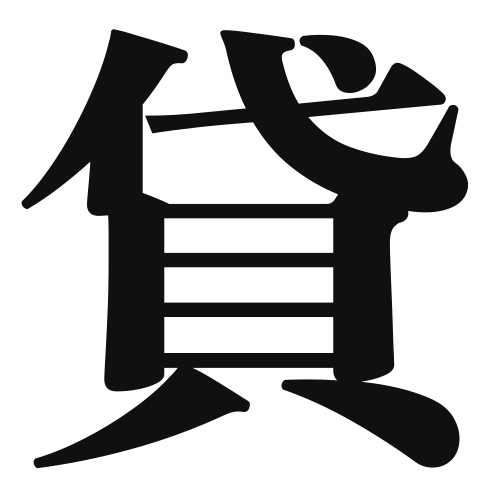1. Overview of Meaning
The kanji “貸” (kashi) means “to lend” or “to loan.” It refers to the act of giving something to someone temporarily, with the expectation that it will be returned.
2. Formation and Radical
Formation of the Kanji: The kanji “貸” is a compound character (会意文字) that combines two elements: the radical for “money” (貝) and the character for “to lend” (可). This combination signifies the act of lending money or valuables.
Radical: The radical of “貸” is 貝, which is associated with money and valuables.
3. Examples of Usage
Common Words and Phrases:
- 貸し出し (かしだし, kashidashi) – lending
- 貸し手 (かして, kashite) – lender
- 貸し借り (かしかり, kashikari) – borrowing and lending
Example Sentences in Daily Conversation:
- この本を貸してもいいですか? (このほんをかしてもいいですか?) – Can I lend you this book?
- 友達からお金を貸してもらった。 (ともだちからおかねをかしてもらった。) – I borrowed money from a friend.
4. Synonyms and Antonyms
Similar Kanji:
- 借 (しゃく, shaku) – to borrow. While “貸” refers to lending, “借” refers to the act of borrowing.
Opposite Kanji:
- 返 (へん, hen) – to return. This kanji represents the action of giving back something that was borrowed.
5. Cultural and Historical Background
Relation to Japanese Culture: The concept of lending and borrowing is significant in Japanese culture, reflecting values of trust and responsibility. It is common to lend items among friends and family.
Proverbs and Idioms:
- 貸し借りは友の始まり (かしかりはともにはじまり) – Lending and borrowing is the beginning of friendship. This proverb emphasizes the importance of sharing and mutual support in relationships.
